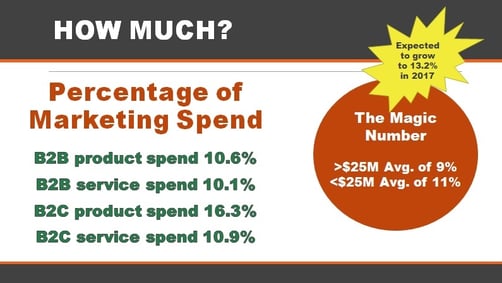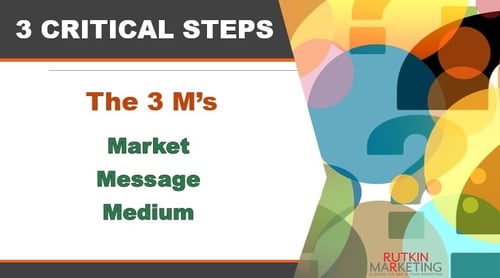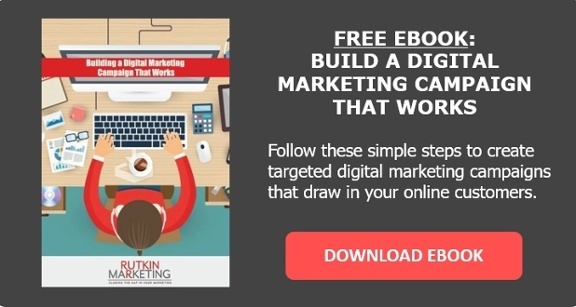Digital Marketing is a moving target. Every month, it feels like there’s a new social network, ad platform, or change to the Google algorithm you need to know. The reality is digital marketing is constantly changing. With these changes, comes the pressure to “keep up”. But effective marketing comes from being strategic, not jumping from trend to trend just because it's popular.
As a company, I’m sure you already have a LinkedIn page, a Facebook page and maybe even a Twitter handle for your business, but so does your competition.
What you truly need is a cohesive strategy that lets you engage with your target niche audience – to achieve your goals and objectives.
At a recent business leadership event, I had the opportunity to sit down and talk with a range of CEOs, business owners and sales and marketing executives from the technology, software, accounting, and professional services space about how to build an effective digital marketing strategy. Here are some of the highlights:
First – Ask Why?
The first step to building any strategy is understanding the “why” behind your efforts. Too often, I see clients make the mistake of building a strategy around a certain platform or tactic without considering what they’re really trying to accomplish.
An effective digital marketing strategy must start with the following:
-
- Clear business objectives.
- A defined strategy on who, what and how to get there.
- Plus, all associated time and costs necessary from you (the business owner), other members of your team, or the marketing firm you outsource it too.
Second – Ask How Much?
According to a study by the Duke University Fuqua School of Business, the average business spends about 10% percent of its total annual revenue on marketing. Experts report this number is expected to grow to 13.2 percent over the next year and to a whopping 21.4 percent over the next five years.

Another key point the study reveals is that the average business spends about 9.4 percent of its total marketing budget just on digital marketing alone.
Well, it all depends. When deciding what is the right marketing spend for your business, there are a number of variables to consider, including:
-
- Type of business you’re in – Are you B2B or B2C?
- Are you a new business or have you been around for a long time?
- What type of customers are you going after?
- How do your buyers seek and purchase the types of products/services you offer?
- What are the market conditions?
- What competition is out there?
- What is your sales process?
- How much does it cost for your products and services?
- What kind of expenses do you have?
- How well profits are going?
- What are your target market's needs…so on and so forth?
Be careful not to assume you have it all figured out because every business is different. Markets have also drastically changed over the past few years. On top of that, the way a buyer buys has also changed. You need to dig deep into the data to define your target segments because what may have worked for you in the past may no longer work for you today or in the future.
Third - Ask the 3 M's?
So, the question remains: how can you build an effective digital marketing strategy? The short answer is there is no “one-size-fits-all” plan. To help get started, you need to carefully consider the 3 M's of marketing for your small business. In its simplest form, they are defining:
- The Market
- The Message
- The Medium
Now, let's discuss each step in more detail.
#1: The Market - Who exactly are you targeting?
Of course, no campaign will accomplish anything without clearly defining your target niche first. I can’t tell you how many clients I talk to who don’t focus on a specific target. For example, they often start by defining a target in broad terms like small businesses or mid-sized businesses in the accounting space. But these broad terms do not bring focus to your efforts. Plus, not all markets or buyers are created equal.
The first line of attack is in determining exactly which customers are worth going after. To remain on target, you need to ask yourself the following questions:
-
- Who are your "best" customers?
- What size company? Vertical? Geography?
- What are the buyer roles (e.g. decision-maker, influencers)?
- What are their fears?
- What are their top 3 pain points?
- How do they make purchase decisions?
- What are their emotional triggers and motivators?
- Where do they go to seek information?
- What media and social channels do they use?
#2: The Message - What exactly is your message?
The next area to crack is to figure out the goals of the campaign along with the key messages that will make the greatest impact in attracting, engaging and converting your buyers to customers. Some questions to ask are:
-
- What is the goal of your campaign?
- What are the top 3 messages to convey in solving their pain points?
- What target keywords are associated with the campaign?
- What content do you need to create?
- What is the tone/language you will use to attract/convert?
- What action do you want them to take as a result of the campaign?
#3: The Medium - What platforms or channels do your customers live on?
Next, you need to figure out the right mediums to focus your efforts on. Here are a few questions you should ask when determining what platforms and channels to use:
-
- What platforms or channels do your customers live on?
- Are they likely to look online for answers to their questions, or would they rather be communicated with more traditional methods?
- Based on the data, what channels make the most sense to promote the campaign?
- How frequently should you promote the campaign via those channels?
- What tasks need to happen to execute?
- How will you measure success?
When making your decision on which medium make the most sense, keep in mind that not every channel is a good match for every business. I could try to explain all of the incredible things that an expertly planned and implemented digital marketing strategy can do for your business, but when it comes to this sort of thing, I'm all about starting with the 3 M's of marketing first.
Are you ready to build a digital marketing strategy that works?
We can help you. Contact us today! We'll meet with you to learn more about your business, your challenges and your goals. Let's start by discussing your marketing needs. Together, we can determine if it makes sense for us to continue the conversation and explore if we are a good fit in working with each other.




